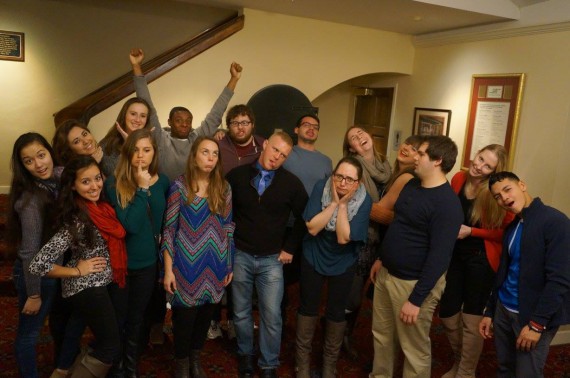
IQ, EQ, and what I really brought back from Italy
Written by Melissa March 1, 2015






I’ve been back in the U.S. for almost 3 months now (wow, that was hard to say) and in that time I’ve already seen the benefits of my study abroad experience at work.
Not only do I have great stories to tell my friends, I have awesome examples to use for interviews, which I have in pretty much every job interview since my return. Traveling every weekend and all the inevitable mishaps that happen along the way shows adaptability and team work. It can work for showing passion for learning too, really any way you want to spin it, just talk about the way it was most rewarding for you. Dealing with the intense structure of the CIMBA day-to-day schedule shows successful (hopefully) time management. Learning a new language in order to communicate more effectively with the local people in such a small town as Paderno del Grappa, speaks for itself really, development of communication skills so impressive they overcome language barriers. Study abroad in general shows people, potential employers or not, that you’re open-minded, willing to take risks, and can appreciate the differences in cultures and people. Not only did I study abroad, I studied abroad with CIMBA. Without CIMBA, I wouldn’t have had the self-understanding that I have today.
Last week I gave a professional development presentation to my Resident Advisor staff members and, of course, I chose a topic from our LEAP leadership class at CIMBA. I taught my staff about the importance of emotional intelligence to employers, which is a person’s ability to understand and handle his/her emotions and interpret the emotions of others around him/her as well. In an article on the Discovering My Best website, an interface created by CIMBA professionals to help us keep track of our bio-assessment (hormone tests, heart rate and stress level monitoring during situations, EEG results, etc.) and personality assessment results, it says that emotional intelligence was the #2 reason why new hires fail, according to over 5000 managers. That’s huge! Clearly, if more people understand what EQ is and how to improve it, we will all be more successful in our jobs! So as a staff, we played some awesome, scientifically-backed brain development games on My Brain Solutions (like Lumosity, but Lumosity doesn’t have any scientific evidence to prove it helps) that helped with resilience, self-regulation, and emotional intelligence. I also talked to the staff about one of the hardest things I’ve ever had to do that I learned in CIMBA, mindfulness. Mindfulness is a state of being present in the moment and you can practice mindfulness with focus activities (like meditation) such as mindful breathing. I showed my staff part of a TED Talk by Dan Siegel, a founder of the field of Interpersonal Neurobiology who actually visited us at CIMBA to discuss the significant positive effects of mindfulness, about what he calls “mind sight” and how people being aware of and able to control mind sight makes the world a better place. Watch below from 5:56 to 7:17.
I told my staff about our mindfulness exercise every day after lunch at CIMBA and how it felt to climb from 5 min to 12 min over three months and how that helped me. Then I got vulnerable with my staff and brought up my Discovering My Best account to show them my personal results. My hormone levels, cortisol (the stress hormone), and DHEA levels during really stressful situations that were monitored. I showed my staff (and my boss haha, which could be a good or bad thing) how my cognitive abilities were affected by intensely stressful situations and my ability to perform tasks overall under stress. I showed them my brain’s abilities in my assessments and I hope it helped them to see how important it is to know these things about ourselves because in that awareness we can then improve ourselves in so many ways. There are so many skills we can develop even further upon that people usually think are part of “just the way we are” or come with us when we’re made and can’t be changed. Our brain can skill grow and learn to be positive if we practice focusing on positive things in our environment, rather than resorting to our tendency toward negative thinking.
I learned so much in Italy. It wasn’t the typical study abroad experience, although I don’t think anyone can use the word “typical” to describe a study abroad experience. With CIMBA, it was so much more than studying abroad, it was professional development, neurological self-discovery and self-understanding, goal-setting and achieving, personal coaching, living outside my comfort zone, and challenging myself to be a better me in only three months. I’ll carry all that with me for the rest of my life, though later on in life I might need a refresher on what cortisol is.








